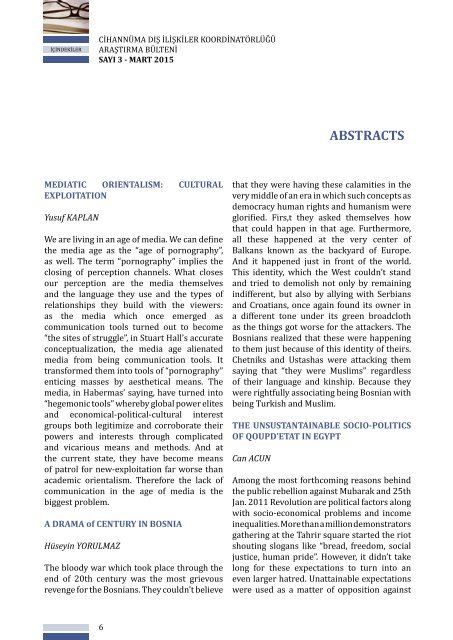Create successful ePaper yourself
Turn your PDF publications into a flip-book with our unique Google optimized e-Paper software.
İÇİNDEKİLER<br />
CİHANNÜMA DIŞ İLİŞKİLER KOORDİNATÖRLÜĞÜ<br />
ARAŞTIRMA BÜLTENİ<br />
SAYI 3 - MART 2015<br />
ABSTRACTS<br />
MEDIATIC ORIENTALISM: CULTURAL<br />
EXPLOITATION<br />
Yusuf KAPLAN<br />
We are living in an age of media. We can define<br />
the media age as the “age of pornography”,<br />
as well. The term “pornography” implies the<br />
closing of perception channels. What closes<br />
our perception are the media themselves<br />
and the language they use and the types of<br />
relationships they build with the viewers:<br />
as the media which once emerged as<br />
communication tools turned out to become<br />
“the sites of struggle”, in Stuart Hall’s accurate<br />
conceptualization, the media age alienated<br />
media from being communication tools. It<br />
transformed them into tools of “pornography”<br />
enticing masses by aesthetical means. The<br />
media, in Habermas’ <strong>say</strong>ing, have turned into<br />
“hegemonic tools” whereby global power elites<br />
and economical-political-cultural interest<br />
groups both legitimize and corroborate their<br />
powers and interests through complicated<br />
and vicarious means and methods. And at<br />
the current state, they have become means<br />
of patrol for new-exploitation far worse than<br />
academic orientalism. Therefore the lack of<br />
communication in the age of media is the<br />
biggest problem.<br />
A DRAMA of CENTURY IN BOSNIA<br />
Hüseyin YORULMAZ<br />
The bloody war which took place through the<br />
end of 20th century was the most grievous<br />
revenge for the Bosnians. They couldn’t believe<br />
that they were having these calamities in the<br />
very middle of an era in which such concepts as<br />
democracy human rights and humanism were<br />
glorified. Firs,t they asked themselves how<br />
that could happen in that age. Furthermore,<br />
all these happened at the very center of<br />
Balkans known as the backyard of Europe.<br />
And it happened just in front of the world.<br />
This identity, which the West couldn’t stand<br />
and tried to demolish not only by remaining<br />
indifferent, but also by allying with Serbians<br />
and Croatians, once again found its owner in<br />
a different tone under its green broadcloth<br />
as the things got worse for the attackers. The<br />
Bosnians realized that these were happening<br />
to them just because of this identity of theirs.<br />
Chetniks and Ustashas were attacking them<br />
<strong>say</strong>ing that “they were Muslims” regardless<br />
of their language and kinship. Because they<br />
were rightfully associating being Bosnian with<br />
being Turkish and Muslim.<br />
THE UNSUSTANTAINABLE SOCIO-POLITICS<br />
OF QOUPD’ETAT IN EGYPT<br />
Can ACUN<br />
Among the most forthcoming reasons behind<br />
the public rebellion against Mubarak and 25th<br />
Jan. 2011 Revolution are political factors along<br />
with socio-economical problems and income<br />
inequalities. More than a million demonstrators<br />
gathering at the Tahrir square started the riot<br />
shouting slogans like “bread, freedom, social<br />
justice, human pride”. However, it didn’t take<br />
long for these expectations to turn into an<br />
even larger hatred. Unattainable expectations<br />
were used as a matter of opposition against<br />
6


